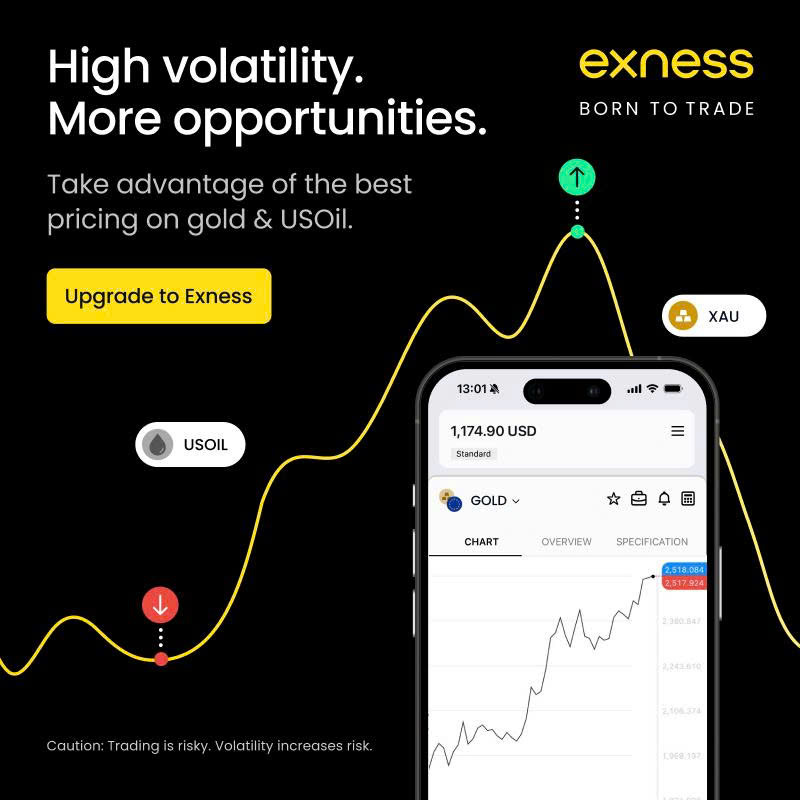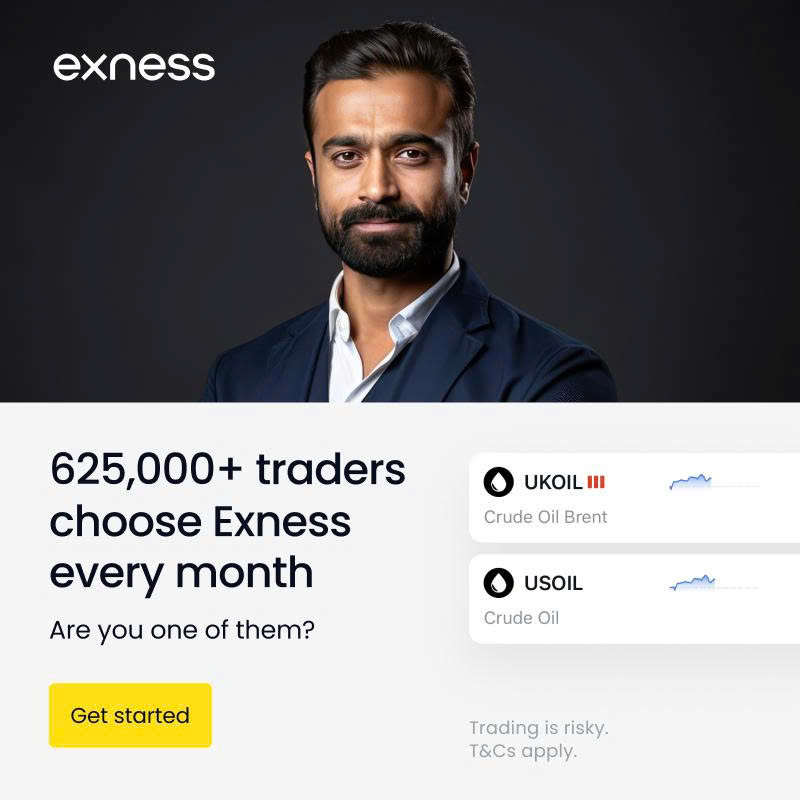
7 minute read
Is Exness Regulated in Ghana? Everything You Need to Know
from Exness
by Exness Blog
If you're a trader in Ghana wondering, "Is Exness regulated in Ghana?" the short answer is: Exness is not directly regulated by Ghanaian authorities, but it operates legally in Ghana under international licenses from reputable regulators like the FCA, CySEC, and FSA. This means Ghanaian traders can use Exness with confidence, knowing it adheres to strict global standards. But let’s dive deeper into what this means for you, how Exness operates in Ghana, and why it’s a popular choice for forex and CFD trading.

✅ Trade with Exness now: Open An Account or Visit Brokers 👈
In this article, I’ll break down Exness’s regulatory status, its services in Ghana, the pros and cons for local traders, and tips to get started. Whether you’re a newbie or a seasoned trader, this guide will help you decide if Exness is the right platform for you.
What Is Exness, and Why Does Regulation Matter?
Exness is a global forex and CFD broker founded in 2008, headquartered in Cyprus. It’s grown into one of the world’s leading trading platforms, serving millions of clients across over 200 countries. With Exness, you can trade forex pairs, cryptocurrencies, commodities, stocks, and indices on platforms like MetaTrader 4 (MT4), MetaTrader 5 (MT5), and their proprietary Exness Terminal.
Regulation is a big deal when choosing a broker. Why? Because it ensures your funds are safe, the broker operates transparently, and there’s accountability if something goes wrong. In Ghana, where forex trading is gaining traction thanks to increased internet access and mobile money, understanding a broker’s regulatory status is crucial for peace of mind.
Is Exness Regulated in Ghana?
Let’s get straight to the point: Exness is not regulated by the Bank of Ghana (BoG) or the Securities and Exchange Commission of Ghana (SEC). Ghana doesn’t have a specific regulatory framework for forex brokers, which is common in many African countries. Instead, Exness operates in Ghana under its international licenses, primarily through its entity, Exness (SC) Ltd, regulated by the Financial Services Authority (FSA) in Seychelles (license number SD025).
Here’s a quick look at Exness’s key regulatory licenses:
Financial Conduct Authority (FCA) in the UK: A top-tier regulator ensuring high standards of transparency and client fund protection.
Cyprus Securities and Exchange Commission (CySEC): Governs Exness’s operations in the EU, adhering to strict financial rules.
Financial Services Authority (FSA) in Seychelles: Oversees Exness’s global entity, which serves Ghanaian traders.
Other regulators: Exness is also licensed by the Financial Sector Conduct Authority (FSCA) in South Africa, the Capital Markets Authority (CMA) in Kenya, and more.
While these international licenses don’t equate to local regulation in Ghana, they provide a robust layer of oversight. Exness complies with global standards like Know Your Customer (KYC) and Anti-Money Laundering (AML) protocols, ensuring your funds are kept in segregated accounts and protected from misuse.
Does This Mean Exness Is Safe for Ghanaian Traders?
Absolutely, but with a caveat. Exness’s international regulations make it a low-risk broker for Ghanaian traders. Features like negative balance protection ensure you can’t lose more than your deposit, and regular audits by firms like Deloitte add another layer of trust. However, since Ghana lacks a local forex regulatory body, you’re relying on Exness’s offshore licenses (like the FSA in Seychelles) for protection, which may not cover you as comprehensively as a local regulator would.
For most Ghanaian traders, this setup is perfectly fine. Exness has a solid reputation globally, and many traders in Ghana have used it without issues since 2008. Just make sure to verify your account properly and trade responsibly to minimize risks.

✅ Trade with Exness now: Open An Account or Visit Brokers 👈
Why Ghanaian Traders Love Exness
Exness has become a go-to platform for Ghanaian traders, and it’s easy to see why. Here are some reasons it stands out:
1. Low Minimum Deposit
Exness offers one of the lowest entry points in the industry. For example, the Standard Cent account requires just $1 (or about GHS 15) to start trading. This is a game-changer for beginners or those with limited capital, especially in Ghana, where economic challenges can make high minimum deposits a barrier.
2. Mobile Money Support
Ghana’s mobile money revolution (think MTN Mobile Money and AirtelTigo) makes Exness super accessible. You can deposit and withdraw funds using mobile money, with withdrawals typically processed within 24 hours. This is a huge plus for traders in Accra, Kumasi, or even rural areas with mobile money access.
3. Competitive Spreads and Leverage
Exness offers tight spreads (starting from 0.0 pips on Raw Spread accounts) and unlimited leverage (subject to regional regulations). While unlimited leverage can amplify profits, it’s a double-edged sword—use it wisely to avoid big losses.
4. User-Friendly Platforms
Whether you’re trading on MT4, MT5, or the Exness Terminal, the platforms are intuitive and packed with tools like real-time charts and Trading Central analysis. Plus, the Exness mobile app lets you trade on the go, which is perfect for Ghana’s mobile-first traders.
5. Educational Resources
Exness provides webinars, tutorials, and articles to help you level up your trading game. While these aren’t Ghana-specific, they’re beginner-friendly and great for building confidence.
Challenges for Ghanaian Traders
While Exness is a solid choice, there are a few challenges to keep in mind:
Lack of Local Regulation: As mentioned, Exness isn’t regulated by the Bank of Ghana, so you’re relying on international licenses. Always double-check the broker’s credentials and read reviews from other Ghanaian traders.
Internet and Power Issues: Ghana’s internet penetration is over 50% in 2025, but rural traders may face connectivity issues. Power outages (“dumsor”) can also disrupt trading, so consider using mobile data or backup power solutions.
Currency Volatility: The Ghanaian Cedi (GHS) can be volatile, and since Exness trades in USD, currency conversion fees might apply. Plan your deposits and withdrawals carefully to minimize costs.
Verification Delays: Some traders report delays in withdrawals if their accounts aren’t fully verified. Complete the KYC process (uploading a passport or Ghana Card and proof of address) as soon as you sign up to avoid hiccups.
How to Get Started with Exness in Ghana
Ready to trade with Exness? Here’s a step-by-step guide to set up your account:
Visit the Exness Website or App: Go to exness.com or download the Exness app from the iOS or Android store. Make sure it’s the official site to avoid scams.
Register: Click “Open Account,” fill in your details (name, email, phone number, and Ghana as your country), and agree to the terms.
Verify Your Account: Upload a government-issued ID (like a passport or Ghana Card) and proof of residence (e.g., a utility bill). Verification usually takes 1-3 business days.
Choose an Account Type: Options include Standard, Standard Cent (great for beginners), Pro, Raw Spread, or Zero accounts. Start with a demo account to practice risk-free.
Deposit Funds: Use mobile money, bank cards, or e-wallets like Skrill. The minimum deposit is as low as $1 for Standard accounts.
Start Trading: Download MT4, MT5, or use the Exness Terminal to trade forex, crypto, or commodities.
Pro Tip: Enable two-factor authentication (2FA) and regularly update your password to keep your account secure.
Is Exness Right for You?
Exness is a great fit for Ghanaian traders looking for a reliable, low-cost broker with global credibility. Its low minimum deposits, mobile money support, and user-friendly platforms make it accessible for beginners and pros alike. However, the lack of local regulation and potential internet challenges mean you’ll need to do your homework and trade cautiously.
If you’re still on the fence, try Exness’s demo account to test the platform without risking real money. It’s a great way to explore spreads, leverage, and trading tools before diving in.
Final Thoughts
So, is Exness regulated in Ghana? While it’s not regulated locally, its international licenses from top-tier regulators like the FCA and CySEC make it a trustworthy choice for Ghanaian traders. With competitive spreads, mobile money support, and a beginner-friendly platform, Exness is well-suited for Ghana’s growing forex community.
✅ Trade with Exness now: Open An Account or Visit Brokers 👈
Read more:










